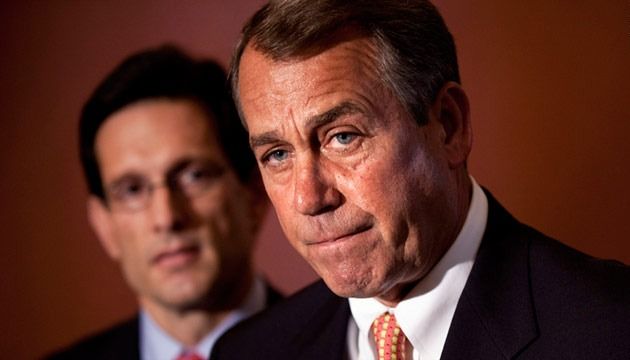Boehner Predicts Deal Will Pass
Speaker John Boehner brings his White House budget deal to a floor vote Thursday, predicting success but still battling worrisome new cost estimates and awkward relations with President Barack Obama, who chose to deliver a partisan-tinged deficit-reduction address on the eve of the debate.
Congressional Budget Office data, posted Wednesday morning, credit the Boehner-Obama deal with capping appropriations at a level nearly $38 billion lower than when Republicans took charge of the House in January. But this will have only a minimal impact on outlays or direct spending before the 2011 fiscal year ends Sept. 30. And once contingency funds related to Afghanistan and Pakistan are counted, the news gets worse: The CBO now says that total appropriations outlays for 2011 are higher — not lower — by about $3.3 billion than it had estimated in December.
“I’ll get there,” the speaker told POLITICO. And given the level of Democratic support, Rep. Rob Andrews (D-N.J.) felt bold enough to predict: “I don’t see any chance that this fails unless the bottom falls out with the House Republicans.”
But that’s exactly the nightmare for Boehner, and much as he dismissed any notion of doing the vote count himself, the speaker took time Tuesday to meet with and fortify those lawmakers charged with doing the whipping for the GOP.
The leadership is betting heavily on loyalty to Boehner and a desire to move on to larger budget battles to hold together the rank and file. “This fight is over, move on to the next one,” said House Armed Services Committee Chairman Buck McKeon (R-Calif.). But Obama’s speech at The George Washington University fed into a new round of partisan sniping, and Republicans were privately baffled that the president gave no heads-up to Boehner when the two men were negotiating the final deal last week on 2011 spending.
Late Wednesday, the Republican Study Committee was preparing its own critique of the deal and, citing the CBO outlay projections, freshman critic Rep. Tim Huelskamp (R-Kan.) dismissed the bill as a “Dollar Store” deal.
“Right now, I’m undecided. I thought I was for it, but I’ve got to find out more of what’s in it,” said Rep. Todd Akin (R-Mo.); and Rep. Joe Walsh, an Illinois freshman, described himself as “genuinely as undecided as a human being can possibly be.”
“You can make a very compelling argument on either side,” Walsh said. “Look, Boehner and the Republicans won when it comes to the straight negotiation. Obama didn’t want to cut, period, and we’re getting cuts. … It’s like we made it this high up the mountain, let’s gather right there, and let’s get ready for the next fight.”
“That’s a compelling argument. But on the other hand, we should’ve made it a lot further up the mountain. On the other hand, that number should be a lot bigger, because the crisis is so big. So in a way, it’s not enough. It’s not nearly enough.”
On the Democratic side, there has been little evidence of the White House helping round up votes, and that task has been left more to Democrats on the House Appropriations Committee, who hope to deliver as many as 70 votes.
But much as it irritated Republicans, Obama’s deficit speech did help among Democrats, and leadership liberals like Michigan Rep. Sander Levin, ranking Democrat on the House Ways and Means Committee, told POLITICO he felt more comfortable now backing the deal.
“The president’s speech will allow me to vote for it because he made clear that Medicare and Medicaid will not be destroyed on his watch,” Levin said. “He drew a larger picture, and I think it was critical for him to do that. … When he paints the larger picture, it makes it possible to vote for a piece about which I have some worries.”
It’s not clear how big a worry CBO numbers will be for Republicans, but as the estimates gained more attention, the whip operation grew more concerned Wednesday night. Outside conservative bloggers picked up on the issue and former Minnesota governor Tim Pawlenty, now running for the GOP presidential nomination, weighed in against the deal.


